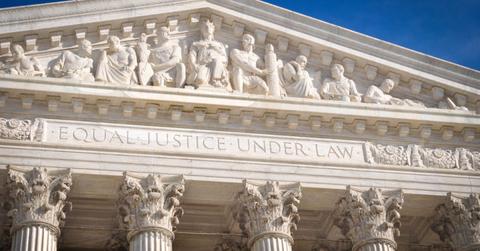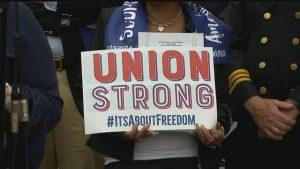
Image Via: CNN
What Janus Vs AFSCME Means For Black Women
By Elysia JJune 29 2018, Published 2:47 p.m. ET
On Wednesday June 27th The Supreme Court issued its ruling in the case of Janus V. AFSCME.
The 5-4 ruling has been cited as “the single mots consequential ruling of the year” by Vox. The ruling is set to have a huge impact on public sector workers as a whole, and a particularly disastrous impact of women of color cross the United States.
What is The Case About?
The case was brought to the Supreme Court by Mark Janus. Janus is an employee of the Illinois Department of Healthcare and Family Services. He sued AFSCME (The American Federation of State, County and Municipal Employees) on the grounds of a first amendment violation. His case argued that government employees who chose not to join unions should not have to pay “fair-share” or “agency” fees. This is despite the fact that the law states that unions must represent all workers equally, meaning that workers who are not members of unions still receive the benefits the Unions advocate for. Janus argued that the fees violated the first amendment rights of non-union workers because it forced them to to fund political advocacy that they may not believe in. The unions disputed this reasoning by pointing out that non-union employees are entitled to refunds on any political activities their money went towards.
What Does the Ruling Mean?
The Supreme Court came down in favor of Janus. This means that non-union government employees no longer have to pay contributions to unions, although they still have to be fairly represented by them. The ruling puts forward a challenge to unions going forward. Because unions have to represent everyone equally they will be forced to provide costly representation to people who have chosen not to pay towards it. Being forced to provide services without being paid for them, means that unions will eventually hit a funding crisis.

Image Via: News12 The Bronx
Why Does the Ruling Hurt Black Women?
Unions over the years have fought for important workplace standards. These include the 40- hour work week, family and medical leave, and health insurance to name just a few. The area that is of particular concern to women of color is the fight for equal pay. Unions have played an essential role in combating the double pay gap faced by black women (the combination of both a racial and gendered pay disparity). The Economic Policy Institute notes that this, as well as the fact that black women have the highest share of workers in the public sector, means that they have the most to lose from the ruling.
Janus Vs AFSCME is set to weaken unions by draining their resources. Black women will suffer the most when unions struggle to keep up their advocacy because historically they have been the most in need of the power of collective bargaining.

